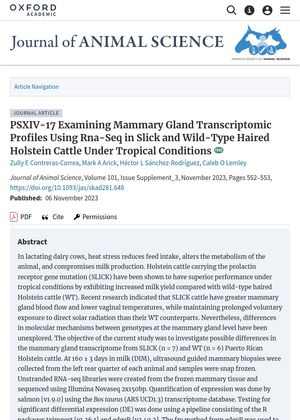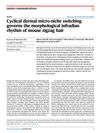Examining Mammary Gland Transcriptomic Profiles Using RNA-Seq in Slick and Wild-Type Haired Holstein Cattle Under Tropical Conditions

TLDR SLICK cattle have better heat tolerance due to specific gene expression and pathway differences.
This study investigated the mammary gland transcriptome differences between SLICK (n=7) and wild-type (WT) haired Holstein cattle (n=6) under tropical conditions. SLICK cattle, known for better performance in heat, showed increased mammary gland blood flow and lower vaginal temperatures. RNA-seq analysis revealed limited differential gene expression, with only one gene (GeneID:513329) significantly different. However, pathway enrichment analysis identified several relevant pathways, such as enriched arachidonic acid metabolism and depleted tight junction function in SLICK cattle. Additionally, genes related to cold response, hair follicle development, and vasoconstriction were downregulated, while those related to oxytocin production and defense against Gram-positive bacteria were upregulated. These findings suggest potential molecular mechanisms that could explain the superior heat tolerance of SLICK cattle.




